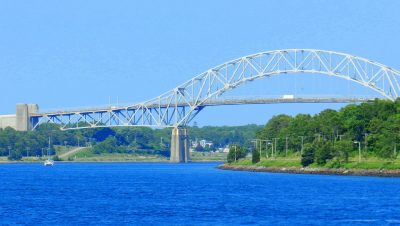
The Cape Cod Canal Bridges Project received an initial $350 million fund from the U.S. Government’s fiscal year budget for the replacement of the aging Sagamore and Bourne bridges, also offering $600 million in total to complete the project.
The budget proposed authorizing the transfer of ownership of the bridges from the U.S. Army Corps of Engineers Civil Works program to the Commonwealth, which would be responsible for their future operation and maintenance.
“The Cape Cod Canal Bridges Project is critical for Massachusetts’ communities and economy,” Governor Maura Healey said in a statement. “I’m grateful to the Biden Administration for committing this $350 million down payment on the project, as well as senators Warren and Markey and Congressman Keating for their leadership and partnership to secure this crucial investment.”
The Bourne and Sagamore bridges, which carry Highway Routes 28 and 6 over to Cape Cod, provide access to the 15 towns of Cape Cod. The bridges are the only hurricane evacuation routes off Cape Cod and the Islands, responsible for the safety of nearly 215,000 year-round residents with an increase of up to 300% during summer tourist season, according to a March 2020 report from the Corps.
Steven Tupper, deputy director of Cape Cod Commission, said the bridges are in “concerning” conditions and “need to be replaced,” due to them being built in 1935.
“As they get older, they’re going to need increasing maintenance in order just to keep basic function of the bridges,” Tupper said.
According to a 2019 USACE report, both bridges are scheduled to undergo their second major rehabilitation for three to seven years, which involves lengthy lane closures and full bridge closures. This would result in costs due to traffic delays, congestion and re-routing, in addition to the costs for bridge rehabilitation itself, estimated at $342.5 million total.
Tupper said the bridges see an average of over 140,000 vehicle crossings per day during the summer season and about 100,000 vehicle crossings on any average off-season day.
“That ultimately would really be problematic for the region’s economy and its people,” he said.
The project aims to provide dependable travel for residents and visitors by replacing the current bridges with two new bridges adjacent to the existing ones.
The replacement bridges will feature improvements to pedestrian and bicycle travel across the canal. Sidewalks will be widened and reconstructed to comply with the standards outlined in the Americans with Disabilities Act and connections to local roadway networks will become smoother, according to a 2019 Department of Transportation report.
David Hsu — associate professor of urban and environmental planning at Massachusetts Institute of Technology — said the project team should think more creatively when designing the new bridges.
“The Cape is a really big tourist destination,” Hsu said. “One of the situations where all the traffic is going one way, and two days later, all the traffic is going the other way.”
To remedy the traffic issue, Hsu proposed changing the direction of middle lanes to increase capacity to accommodate the region’s summer season travel patterns.
Hsu also called for the project team to think about a long-term plan.
“Given that there will be increasing sea level rise and increasing hurricanes on the Cape … having a comprehensive infrastructure strategy for climate change is going to be really important, but that requires a lot of work and rethinking some systems that are basically 100, 150 years old,” Hsu said.
Alan Wiig — associate professor of urban planning and community development at University of Massachusetts, Boston — said it is crucial that the state and local government take into consideration local communities and their livelihoods.
“[The government needs] to ensure that both small businesses and larger businesses aren’t going bankrupt because they don’t have any tourism for the years that the bridge is being rebuilt,” Wiig said.
But some are concerned about the financial sustainability of the project.
Erick Guerra — associate professor of city and regional planning at University of Pennsylvania — said “safety and sustainability” are the most important considerations of big infrastructure projects.
“Obviously, keeping the bridges in a state of good repair is really important, but you also want some sustainable finance mechanisms so that you’re not having to go and seek out external funding every time you need some large capital investments,” Guerra said.
Tupper said the inclusion of the bridges in the President’s budget is evidence of federal support, and he is “more than hopeful” that there will be more opportunities to get funding for the project through the Bipartisan Infrastructure Law, which provides $550 billion for federal infrastructure investments from 2022 to 2026.
Current estimates put the overall project at $4 billion, Tupper said. So far, the project has received $350 million from the state’s 2021 Transportation Bond bill, and a $1.6 million bridge planning grant from the Federal Highway Administration.
“While that’s a relatively small dollar amount in the context of this project, it’s another indicator of federal support for the project,” Tupper said.
With the bridges coming up on their usable service lives, Tupper called for “expedient” and “deliberative” actions from policymakers.
“Given the age of the structures, it’s really not a question of if, but when the bridges need to be replaced,” Tupper said. “Now is the time to really move forward on that.”






















































































































